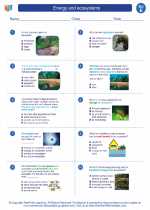Cosmology
Cosmology is the study of the origin, evolution, and eventual fate of the universe. It is a branch of astronomy that seeks to understand the large-scale structure and dynamics of the universe as a whole.
Key Concepts in Cosmology
- Big Bang Theory: This is the prevailing cosmological model for the observable universe from the earliest known periods through its subsequent large-scale evolution.
- Dark Matter: This is a form of matter that is thought to account for approximately 85% of the matter in the universe and about a quarter of its total energy density.
- Dark Energy: This is an unknown form of energy that is hypothesized to permeate all of space, tending to accelerate the expansion of the universe.
- Cosmic Microwave Background Radiation (CMB): This is electromagnetic radiation as a remnant from an early stage of the universe and it is considered the oldest light in the universe.
- Galaxies: These are vast systems of stars, gas, dust, and dark matter that are held together by gravity and are the fundamental building blocks of the universe.
Study Guide for Cosmology
If you're studying cosmology, here are some key topics to focus on:
- Understanding the Big Bang Theory and the evidence supporting it.
- Exploring the properties and effects of dark matter and dark energy on the universe.
- Studying the cosmic microwave background radiation and its significance in understanding the early universe.
- Investigating the different types of galaxies and their role in the structure of the universe.
- Examining the expansion of the universe and the various cosmological models that seek to explain it.
Remember to also familiarize yourself with key scientists and astronomers who have contributed to the field of cosmology, such as Edwin Hubble, George Lemaitre, and Vera Rubin.
Keep in mind that cosmology is a dynamic and evolving field, so staying updated on the latest research and discoveries is essential for a comprehensive understanding of the universe.
Good luck with your studies!
.◂Science Worksheets and Study Guides Fifth Grade. Energy and ecosystems
Study Guide Energy and ecosystems
Energy and ecosystems  Worksheet/Answer key
Worksheet/Answer key Energy and ecosystems
Energy and ecosystems  Worksheet/Answer key
Worksheet/Answer key Energy and ecosystems
Energy and ecosystems  Worksheet/Answer key
Worksheet/Answer key Energy and ecosystems
Energy and ecosystems  Vocabulary/Answer key
Vocabulary/Answer key Energy and ecosystems
Energy and ecosystems  Vocabulary/Answer key
Vocabulary/Answer key Energy and ecosystems
Energy and ecosystems  Vocabulary/Answer key
Vocabulary/Answer key Energy and ecosystems
Energy and ecosystems 

 Worksheet/Answer key
Worksheet/Answer key
 Worksheet/Answer key
Worksheet/Answer key
 Worksheet/Answer key
Worksheet/Answer key
 Vocabulary/Answer key
Vocabulary/Answer key
 Vocabulary/Answer key
Vocabulary/Answer key
 Vocabulary/Answer key
Vocabulary/Answer key

The resources above cover the following skills:
PHYSICAL SCIENCE (NGSS)
Energy
Students who demonstrate understanding can:
Use models to describe that energy in animals’ food (used for body repair, growth, motion, and to maintain body warmth) was once energy from the sun.